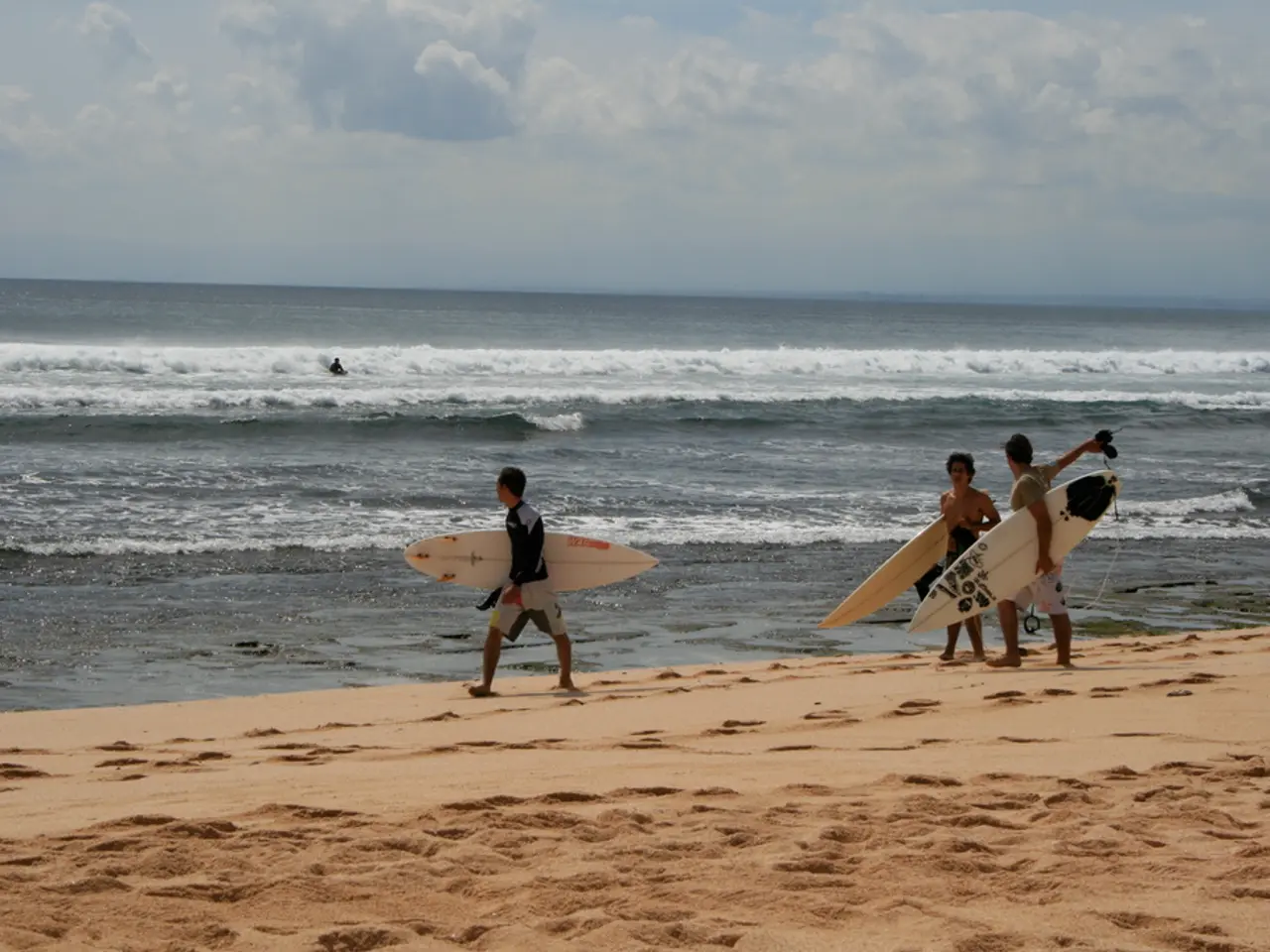Offshore wind energy shows promise, yet challenges persist in its deployment
In the heart of Southeast Asia, Vietnam is embarking on a transformative journey towards a greener future, with global players like DNV and Danish companies playing key roles in the country's Offshore Wind Sector (OSW) development.
Vietnam's commitment to renewable energy is evident in its plans to establish renewable energy industrial and service centres, with OSW at the core, as part of the country's broader implementation of the Just Energy Transition Partnership. This ambitious initiative is supported by the Denmark-Vietnam Energy Partnership, which focuses on long-term energy planning, energy efficiency, OSW, and the integration of renewables into the national grid.
However, challenges remain in the implementation of the new Electricity Law and PDP8, including the need for detailed implementation mechanisms, a transparent, fair, and consistently applied bidding framework, and sub-law documents directing implementation such as guidelines, procedures, and timelines.
Despite these challenges, Danish companies have shown strong interest in the OSW sector in Vietnam. Copenhagen Infrastructure Partners, for instance, is leading a major OSW proposal in the former Binh Thuan province. Vestas, a global leader in turbine manufacturing, is pursuing both onshore and offshore ventures with local partners in Vietnam. Major Danish companies have presented multi-billion-dollar OSW projects in Vietnam.
The push for direct power purchase agreements further opens the market, allowing large electricity consumers to buy renewable power directly from generators, thereby increasing competition and accelerating private sector investment in clean energy.
Recognising the importance of reducing risks in pilot wind projects and generating investments and employment in Vietnam, foreign partners, including Danish companies, play a crucial role in this endeavour. Vietnamese enterprises, particularly Petrovietnam, are well-positioned to play a major role in the emerging OSW industry.
To address regulatory uncertainty, Denmark, with over 30 years of experience, can share best practices in licensing, environmental assessments, and stakeholder engagement. Joint working groups or regulatory exchange programs could help Vietnam adapt proven frameworks to local conditions, reducing legal uncertainties and speeding up project approvals.
Vietnam should prioritise upgrading its ports, grid, and transmission infrastructure with technical assistance from Denmark. Collaborations could include technology transfer, joint venture projects, and training programs for local engineers and technicians. Encouraging local content through preferential policies can also enhance economic benefits and build local expertise.
Vietnam can benefit from Denmark’s experience in policy design, such as feed-in tariffs, auctions, and green certificates, to attract private investment. International partnerships can facilitate access to reasonably priced financing, while transparent bidding mechanisms can ensure a level playing field. Danish development agencies and companies can also support Vietnam in accessing global green finance, blending public and private sources of capital.
Collaborative R&D initiatives, joint pilot projects, and technology transfer agreements can help Vietnam leapfrog to advanced solutions, particularly in areas such as turbine maintenance, marine biodiversity monitoring, and grid integration.
Vietnam is at a pivotal moment in its energy transition, with the new Electricity Law and revised Power Development Plan VIII (PDP8) marking significant progress in the country's commitment to renewable energy. The move towards a market-oriented approach, including more frequent electricity price adjustments and efforts to establish a competitive electricity market, is essential to attract more private investment.
A port readiness report has been released to assess existing Vietnamese ports' capacity to support the first OSW projects. A Vietnamese delegation has visited the United Kingdom to share experience and explore partnership opportunities in the development and supply chain for the OSW industry. The governments of Denmark and Vietnam have supported Vietnam in developing a roadmap for a healthy and expedited OSW industry. Assistance will be provided to the Electricity Authority of Vietnam in developing administrative procedures for venture selection, approval, and monitoring.
The green strategic partnership between Vietnam and Denmark, launched in 2023, has established a solid bilateral framework to support Vietnam’s development of a climate resilient, low carbon economy. The collaboration between these two nations promises a promising future for offshore wind energy, not just for Vietnam, but for the world as a whole.
- Amidst the development of Vietnam's Offshore Wind Sector (OSW) and the country's broader transition to renewable energy, discussions about suitable weather conditions for OSW projects might become relevant to ensure the efficient performance of wind turbines.
- As Danish companies dive into the OSW sector in Vietnam, the impact of sports events and related tourist influxes on the weather could potentially affect construction schedules and the overall progress of OSW projects in the country.




